Antiquity can tell us much about the human condition and often the tales are gripping and provocative. The Founding Fathers were well read in the classics, the true “classics” of ancient Greece and Rome. They knew their Virgil, Tacitus, Thucydides, Plutarch and the like; however, there is an ongoing academic debate as to how much these ancient writers influenced the Founders’ philosophy and morals. Was the Western tradition formative, or was it simply window dressing to a large degree? I’ll let the specialists argue that one. My hope is to describe two formative texts and to persuade my fellow Southerners to give them a try.
I’ll admit I’m a sucker for the glory of Greece, and the grandeur that was Rome! One of the first ancient books I read was Plutarch’s Parallel Lives, which sparked an interest in me, because it had biographies of such giants of history like Julius Caesar and Alexander the Great. Learning about the Roman emperors through Suetonius’ The Lives of the Twelves Caesars was another exciting way of understanding those great men of ancient history. It was Thucydides’ History of the Peloponnesian War that taught me how war was waged, and how man will never know the end of strife.
What moved men in the ancient world often continues to move men now. It’s not that societies don’t change, it’s that human nature remains largely constant. Men want to be loved by a woman, have children, and thirst for adventure. We have that explorative gene, even if it’s been largely suppressed through our schooling and indoctrination. We want something to fight for, and we wish to be a part of something larger than our own individual existence. Virtues such as, loyalty, honor, duty, patriotism, and, of course, some of the darker character traits such as lust, power, and self-aggrandizement are all woven together in books like Thucydides’ Peloponnesian War and Plutarch’s Parallel Lives.
With the Peloponnesian War you get a contemporary account of one of the most formative events in the ancient Greek world. This conflict pitted the two heavyweights of the eastern Mediterranean against each other. Thucydides is genuinely striving to give the reader an honest blow by blow chronicling of this tragedy, and, make no mistake, it was tragic for the Greek people at the time. The war raged on and off for approximately thirty years, and the duality between Sparta and Athens are on full display. In this particular conflict you can see the beginnings of total war. There is high statecraft, diplomacy, espionage, various stratagem, and historical characters that are sometimes heroic and just as often sinister or down right ruthless.
Alcibiades, one of the most fascinating and cynical characters in this entire war, is very illustrative in the duplicitous nature of this long conflict. He was adopted by the greatest statesman of the ancient world, Pericles, but he had none of the virtue of dutiful Pericles. It was Alcibiades who advocated for the disastrous Sicilian expedition. In that misguided adventure Athens lost a large portion of its fighting men and treasury. Alcibiades was able to convince the assembly that conquering Sicily would enhance the prestige and power of Athens, which would therefore help them in their war against Sparta. One might wonder what far off Sicily has to do with winning a war against Sparta, and one would be correct in that suspicion. While it’s true Sicily was wealthy and had a plentiful source of grain, its main city-state Syracuse was arguably as powerful as any city-state within Greece proper.
Alcibiades had to share command with two other generals, Nicias and Lamachus. It was hoped that the shared military responsibilities would temper the excesses of the individual commanders. Instead, the result was confusion and lack of a real cohesive fighting objective. Illustrating the chaotic nature of the Athenian governmental system, Alcibiades was called back to Athens for accusations of profanity and desecration of the gods. What better example than this to highlight the sheer absurdity of the so-called democracy in Athens? You just elected the man to go to war in a far away land and made him a commander, but now you want him to come back home to face crimes for something he allegedly did right before he embarked on this grand mission!
Alcibiades decides not to go home. He leaves Sicily and seeks sanctuary in Sparta, of all places. He is later tried in abstention, deemed guilty of those earlier crimes, and found guilty of treason. Ultimately, he ends up helping Sparta fight effectively against the Athenians in Sicily and in Greece. His saga is one of abandonment by his people, treason against his country, and a return to his motherland, with other misadventures too numerous to recount here.
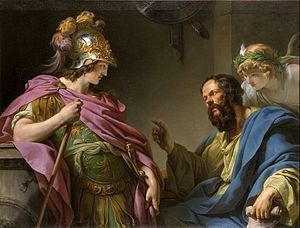
The Athenians, left with their two commanders Nicias and Lamachus, besiege the city of Syracuse. They find that most Sicilians don’t want to revolt against Syracuse, and the vast majority of other smaller cities consider Athens a foreign invader. They would rather sit it out or, if anything, help Syracuse and not Athens. Sparta sends a top general to help Syracuse and a contingent of soldiers and ships as well. What ensues is a standoff with one inconclusive battle at first, followed by a complete naval and land disaster known as the Second Battle of Syracuse.
In this last battle, one terrible thing after another happens. The Athenians have a stalemate naval engagement that ends up being ultimately a loss. They retreat back to their fortifications, and while the commanders want to take their ships and escape, the men are too afraid. Instead, they leave their dead unburied and abandon the wounded. They march inland through a pass which is road blocked and set up for an ambush. A mass slaughter commences and many Athenians are killed. One band surrenders to the Syracusans, while others flee down ravens and smaller streams. A substantial group led by Nicias was looking for drinking water when they were attacked by the Syracusans, resulting in the most significant single military loss in the entire failed two year expedition.
The scene that follows is horrifying. Nicias, who had previously argued for peace, hopes that his men will be treated fairly. They were not. Roughly 7,000 were housed in quarry mines under harsh conditions. Many died there, but most were sold into slavery. The few that managed to escape returned to Athens to recall the horrors of Sicily. The doomed Sicilian Expedition should stand as a symbolic reminder of how hubris can topple an empire from within. With so many good vignettes and morals to be gleaned from the Peloponnesian War, it is difficult to pick only one or two, but for me, the Sicilian Expedition has to be one the most illustrative.
Another very exemplifying scene in the Peloponnesian War is referred to as the Melian Dialogue. Here the reader gets a crash course in power politics. By this time, Athens morphed its so-called Delian League into a tribute paying racket. The island of Melos was the only significant place in the Aegean Sea that the Athenians did not control. They demanded Melos to pay a huge sum of silver for the “defense” of the Delian League. The Melians were ethnically Doric, which was the same ethnicity as those in Sparta, but Melos was independent of the Spartan Empire at the time. In comparison, most of the allies of Athens were of the Ionian Greek stock. This ethnic reality played a role in the war between Sparta and Athens, but it wasn’t the dominant force. Oligarchic versus democratic governance was also a significant factor. Fundamentally, the war was over hegemony in the Greek world. Athens was on the rise and Sparta was insecure about its position in this new geopolitical reality. Democracies tend towards empires and Athens is the prime historical example of this.
The Athenians sent a fairly sizable force to besiege the island of Melos. It lasted for quite some time, and although the Melians were able to have some success against the Athenian army, ultimately they could not hold out. However, before their defeat, emissaries were sent by Athens to negotiate terms. According to the Athenians it boiled down to Melos’ choice of submission or perish. The Melians refused this ultimatum, and their fate was sealed. The Athenians laid waste to their city, executed all the male citizens, and enslaved all the women and children. So much for the notion of a mutual defense league for like minded democracies! This was pure power politics on full display. I find this particular scene in the narrative riveting and it’s where you can see the veil of “democracy” and honor being viciously torn asunder. It is a real case study in the realities of war. It also reminds me of the complete destruction of Carthage by the Roman Republic much later.
There is no good or bad side in this awful war, and this eventually results in the slow decline of the Greek peoples. Both Sparta and Athens take part in atrocities that they would describe as despicable and barbarous. Unfortunately, these are the ways of war. The Peloponnesian War stands as a warning for aspiring empires against hubristic endeavors. Athens reached for the sun and, like Prometheus, was burned to ashes by its own arrogance. There were heroes, however.
Statesmen like Pericles and others in this tale are worth remembering for their intelligent judiciousness in conducting the war effort and for their courage to do what they thought was right for their country. One of the most striking aspects of how the Athenians conducted themselves during this conflict was their use of the new source of silver mineral wealth they found in their territory during the beginning of the war. A new silver mine was tapped, and instead of the citizens voting themselves a stimulus check of sorts, they decided by vote to build the Parthenon that still stands today. Can you imagine American citizens doing the same today?
To dedicate oneself and the whole polity to the pursuit of beauty, even in a time of trouble, is so extraordinary that it almost doesn’t seem possible for men to do such things. This is one reason why the Athenians should be remembered, and if not venerated, at least respected. The Peloponnesian War brought out the best and worst of men. When I read this awe inspiring book, I almost cannot believe these were actual men and not “heroes” from the Iliad or Odyssey. You have to pinch yourself to be reminded that these were merely mortal men but some should be remembered as heroes.

Plutarch’s Parallel Lives is another valuable ancient book. It has inspired me more than any single book I’ve read. It’s essentially a book of heroes, but the heroes are all too human. Plutarch was actually living in the time of the early Roman Empire, but he had access to all the primary sources, most of which have been lost throughout history. Many scholars minimize the historic value of this text because of Plutarch’s comparison of Greeks and Romans for moral, rather than academic or biographical, purposes.
Plutarch wanted his readers to get something out of these stories. He wanted to teach a moral lesson. Plutarch examines twenty-three paired lives. Julius Caesar is compared to Alexander the Great, Pericles is compared to Fabius Maximus, and the list goes on. All of the people described have some human flaw, and it is often difficult beyond personal preference, to determine who is the more admirable subject.
Most of the mini biographies are under fifty pages and make for quite enjoyable reads. This book can open up an entire world, an ancient world, one filled with grand deeds, ascents, decays, and tragedies. Plutarch always seems able to fit in a quirky tidbit about the relevant person that helps round out the hero’s character. If you get a good translation, there will often be annotations to help provide the details given. For me, you can learn about famous battles and larger than life struggles, but it takes knowing a person to bring history to life. Some might say they don’t like history, or they aren’t interested in this or that time period, but really they just don’t know the right historical person to spark an interest in whatever topic they’re studying. Reading a particular biography often inspired my further investigation of a specific historical period. I’d regularly find myself rooting for the person I was reading about and became emotionally invested in their outcome.
Themistocles’ story is particularly moving. His is the quintessential Greek tragedy, and he is a man who inspires great sympathy. Born in a suburb of Athens, Themistocles was likely only half Athenian. His mother being either Thracian or Carian. Although he grew up outside the walls of Athens, he persuaded wealthier children to play with him in his neighborhood, an early example of his cleverness. According to Plutarch, his teacher is said to have remarked, “My boy, you will be nothing insignificant, but definitely something great, either for good or evil.”
The time preceding Themistocles’ childhood was one of massive political and social transition. Athens was ruled by a series of tyrants who had recently been overthrown. And, the statesman, Cleisthenes, had set up the precursor to democracy. Themistocles came of age during the first Persian invasion and built his reputation in a time of heightened political agitation and danger. Miltiades, the hero of the famous Battle of Marathon, while fighting heroically in another battle, sustained wounds that would eventually kill him. Unfortunately, Miltiades was also fined for “deceiving the Athenian people,” a trumped up charge that would become a fairly regular occurrence in the Golden Age of Athens. Themistocles was able to increase his prestige and political power in the wake of Miltiades passing. In many ways, his fate would mirror that of Miltiades and so many other Athenian heroes.
Themistocles advocated for the building of triremes (long wooden ramming ships). He was usually at odds with the established oligarchic powers, most personified by a man named Aristides and nicknamed “the Just.” There are so many historical lessons to be gleaned from the Ancients and Athenian politics is one such example. Was Themistocles trying to improve his position, or was he putting forth a policy that would ensure Athenian dominance in the Aegean Sea and help ensure their security against rival powers like Sparta and Persia? Any of these motivations appear plausible. What is known is that the Athenian democracy eventually decided to use much of those newer silver deposits to create the fleet that Themistocles was emphatically promoting.
Although I have mixed feelings about democracy in general, and I am no fan of the neoliberal mess we find ourselves in now. I do see many of the subtle and sometimes even clear dangers in the need to convince the mob to secure policy decisions. Many competent generals and statesmen were throttled by the Athenian form of politics and judicial overreach. It tends to remind me of our current political circumstances. Men of action like Themistocles could actually accomplish quite a lot. As long as they were mostly successful, they would likely be allowed to carry out their stratagems, at least for a time.
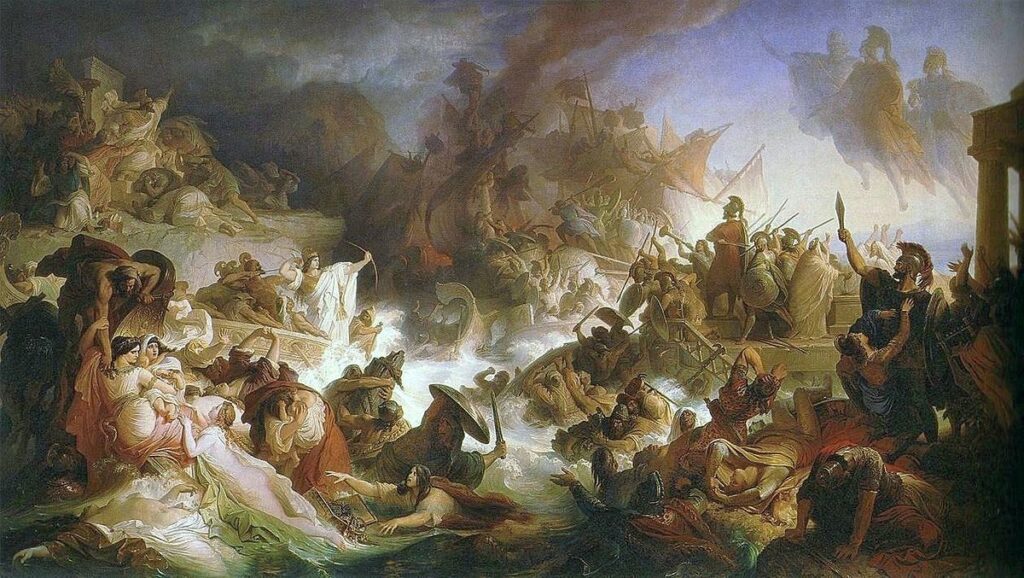
Themistocles’ greatest hour would be the lead up to the Battle of Salamis, one of the most significant battles in all of Western civilization. Preceding the actual battle, Themistocles was able to persuade most of the Athenians to pack up and live on their ships, to essentially abandon the indefensible city, to strong-arm Sparta to acquiesce to the strategy, and to set the Persians up for the monumental sea battle. None of this would have been possible unless Themistocles knew how to work the crowd, fight and win battles, and place his bets at the right time. Timing is often almost everything.
Even before the battle, Themistocles played politics and subterfuge with the enemy. He told the Persians that the Athenians would defect to their side, or at least not fight as hard. Was this just a ruse, or was it a prime example of his uncanny ability to fight the enemy every way possible in order to assure Athens the best possible outcome? Was he really hedging his bets, and hoping that even if everything failed, his people would suffer a less damning fate than other coalition member city-states? Who knows? What we do know is that it was an act of cleverness that would make even Odysseus blush. It exemplifies Themistocles wisdom and cunning. He was willing to do what was necessary to preserve his people, not just his personal political power.
During the actual battle, the surrounding geography played a key part in victory. The body of water they fought in was actually very narrow and surrounded by jagged mountainous terrain. The large Persian fleet wouldn’t be able to maneuver as well as the Athenians, thereby ensuring more confusion in the ensuing naval brawl. Aristides, Themistocles’ rival, had been ostracized (formally exiled) but he was allowed to return to help defeat the Persians in a unified Athenian force. He and others were welcomed back at Themistocles’ request. This again reveals Themistocles’ cleverness and shrewd judgement. Winning mattered more than his own political ambitions. To secure their future, Athens had to win, and win they did and in resounding fashion.
Themistocles was proclaimed the savior of Greece. Even Sparta awarded him a special honor for his “wisdom and cleverness.” The other Greeks were starting to realize how important the Athenian fleet was for their protection, and while Themistocles’ fame was higher than all those throughout the realm, this brought increasing envy and jealousy from both Spartan and Athenian alike. Heavy is the head that wears the crown or, in this case, the laurel. Themistocles had all sorts of machinations on how to increase his glory and that of Athens. He even wanted to destroy the allied fleet at anchor, but Aristides dissuaded him. I wonder how an all-powerful Athens would have become without any other significant Grecian fleet to check their rise. For a sense of the awe inspiring prominence Themistocles had, we can turn to Plutarch. Plutarch reports that at the next Olympic Games:
“[when] Themistocles entered the stadium, the audience neglected the contestants all day long to gaze on him, and pointed him out with admiring applause to visiting strangers, so that he too was delighted, and confessed to his friends that he was now reaping in full measure the harvest of his toils in behalf of Hellas.”
This level of honor and prestige cannot be measured or compared with modern celebrities. You’d have to combine what it might have been like to be Eisenhower on parade after WWII, or the winning quarterback of a Superbowl, to even scratch the heights Themistocles was occupying in his time.
Themistocles had grand designs for Athens. He was able to rebuild and fortify the walls of Athens. Although, Sparta objected to the plan by pointing out that if Persia captured the city it would be all the more difficult to retake in the future. Themistocles, rightly, would have none of that and, through deceiving Sparta, was able to get those great walls rebuilt. Before the Persian invasion was completely wrapped up, Themistocles was stripped of supreme command, and although he took part in the closing operations, he was no longer in charge of the war effort. He had acquired many enemies from within and without. Had he not been a war hero, Themistocles likely would have been exiled. As it were, after a few more military engagements, the Persians were defeated once and for all.
Now, if this were how the story ended it wouldn’t really be a Greek Tragedy. This gets so down right heart wrenching and gut churning it sometimes still brings a tear to my eye. So, what happened to Themistocles? Does he set up somewhere in the Attic hinterland living high on the hog and telling dramatic war stories to his grandkids? No, not so much.
Themistocles would be lampooned by the poets and dramatist, the Spartans would promote a hopeful rival inside Athenian politics named Cimon, and after building a statue to the god Artemis by his home, Themistocles was formally ostracized. He beat the charges of bribery that were associated with a disgraced Spartan general, but he couldn’t be the man he was and be allowed to stay in Athens. Things were too hot, and he was too damn popular. It’s important to remember that ostracism in ancient Athens usually didn’t imply wrongdoing per se, but was meant more as a “cooling off” period. The idea was the person exiled would lose some arrogance, get humbled, and be able to come back in a few years.
While Themistocles was traveling in exile, Sparta leveled more charges in connection to their own traitor, Pausanias. While these accusations were likely false, and he was later acquitted, it probably influenced Themistocles’ decision to go to the outskirts of the Greek world far to the northwestern part of the country and from there eventually, and ironically, to Persia. For a good while he lived a life of luxury and didn’t have to interact with the Persian King. He even successfully had his family smuggled out of Athens and into a city in Ionia (western Turkey) called Magnesia. There, he ruled as governor and even hunted with the Persian King from time to time. He later advised the King on his dealings with the Greeks, as well. His life meets a rather tragic end and I, again, refer the reader to Plutarch:
“But when Egypt revolted with Athenian aid…and Cimon’s mastery of the sea forced the King to resist the efforts of the Hellenes and to hinder their hostile growth…messages came down to Themistocles saying that the King commanded him to make good his promises by applying himself to the Hellenic problem; then, neither embittered by anything like anger against his former fellow-citizens, nor lifted up by the great honor and power he was to have in the war, but possibly thinking his task not even approachable, both because Hellas had other great generals at the time, and especially because Cimon was so marvelously successful in his campaigns; yet most of all out of regard for the reputation of his own achievements and the trophies of those early days; having decided that his best course was to put a fitting end to his life, he made a sacrifice to the gods, then called his friends together, gave them a farewell clasp of his hand, and, as the current story goes, drank bull’s blood, or as some say, took a quick poison, and so died in Magnesia, in the sixty-fifth year of his life…They say that the King, on learning the cause and the manner of his death, admired the man yet more, and continued to treat his friends and kindred with kindness.”
I like to believe the legend that says Themistocles’ bones were eventually returned to his homeland in Athens. It had to be in secret, since traitors were not permitted to be buried in Attica/Athens. The city of Magnesia built memorials to him and paid his family a stipend for his service. Here is a man who fought and bled for his country. Here is a man who is taken in by his enemy who grows to respect him in such a way that his family is taken care for many years to come. Was Themistocles truly a traitor, or was he another Athenian tragedy?
Stories like this one are why we should recognize and read Plutarch. There are so many more little gems in Themistocles’ story alone that it could fill many more pages. I tried to do it justice and hope I persuaded you to give Plutarch and Thucydides a try. Thomas Jefferson and many of our great Southern men did, so why not you?
-By JJ, Old Dominion Cavalier

O I’m a good old rebel, now that’s just what I am. For this “fair land of freedom” I do not care at all. I’m glad I fit against it, I only wish we’d won, And I don’t want no pardon for anything I done.

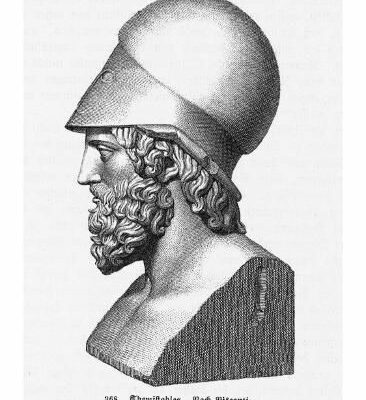
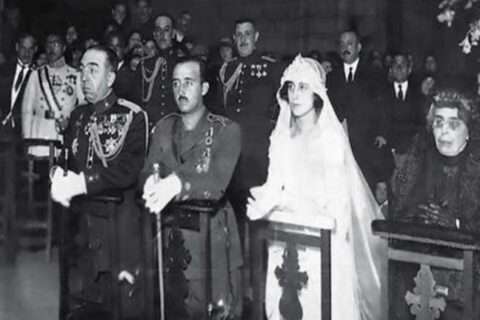
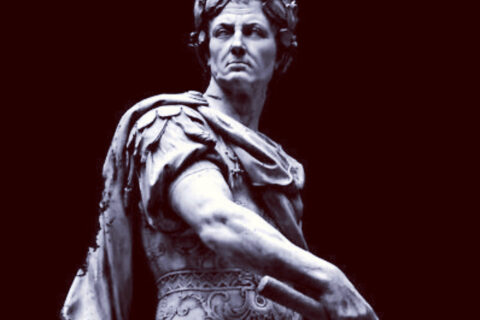

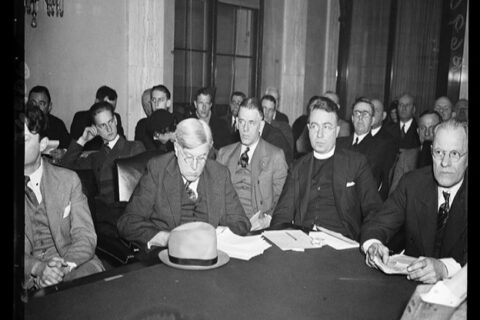
This sounds very similar to what they were talking about on Rebel Yell yesterday. It’s always interesting seeing how similar our lives are to these ancient men.